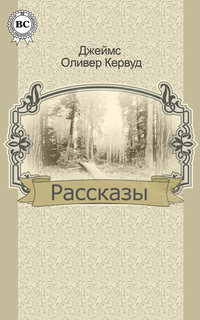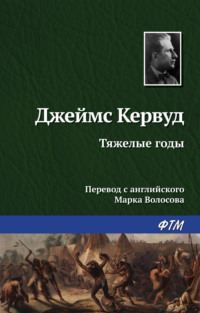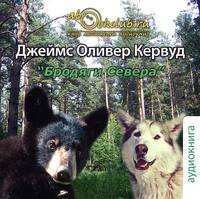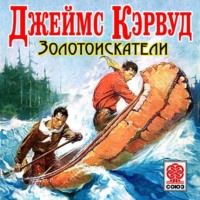
The Valley of Silent Men
He did not know when he ceased fighting. The day went out. Night came. The world was oblivion. And for a space he ceased to live.
CHAPTER XXIII
An hour later the fighting forces in his body dragged Kent back into existence. He opened his eyes. The shock of what had happened did not at once fall upon him. His first sensation was of awakening from a sleep that had been filled with pain and horror.
Then he saw a black rock wall opposite him; he heard the sullen roar of the stream; his eyes fell upon a vivid patch of light reflected from the setting sun. He dragged himself up until he was on his knees, and all at once a thing that was like an iron hoop – choking his senses – seemed to break in his head, and he staggered to his feet, crying out Marette's name. Understanding inundated him with its horror, deadening his tongue after that first cry, filling his throat with a moaning, sobbing agony. Marette was gone. She was lost. She was dead.
Swiftly, as reason came, his eyes took in his environment. For a quarter of a mile above him he could see the white spume between the chasm walls, darkening with the approach of night. He could hear more clearly the roar of the death-floods. But close to him was smooth water, and he stood now on a shelving tongue of rock and shale, upon which the current had flung him. In front of him was a rock wall. Behind him was another. There was no footing except where he stood. And Marette was not with him.
Only the truth could batter at his brain as he stood there. But his physical self refused to accept that truth. If he had lived, she must live! She was there – somewhere – along the shore – among the rocks —
The moaning in his throat gave way to the voicing of her name. He shouted, and listened. He swayed back along the tongue of rock to the boulder-strewn edge of the chasm wall. A hundred yards farther on was the opening of the Chute. He came out of this, his clothes torn from him, his body bleeding, unrecognizable, half a madman, – shouting her name more and more loudly. The glow of the setting sun struck him at last. He was out from between the chasm walls, and it lighted up the green world for him. Ahead of him the river widened and swept on in tranquil quiet.
And now it was no longer fear that possessed him. It was the horrible, overwhelming certainty of the thing. The years fell from him, and he sobbed – sobbed like a boy stricken by some great childish grief, as he searched along the edge of the shore. Over and over again he cried and whispered Marette's name.
But he did not shout it again, for he knew that she was dead. She was gone from him forever. Yet he did not cease to search. The last of the sun went out. Twilight came, and then darkness. Even in that darkness he continued to search for a mile below the Chute, calling her name more loudly now, and listening always for the answer which he knew would never come. The moon came out after a time, and hour after hour he kept up his hopeless quest. He did not know how badly the rocks had battered and hurt him, and he scarcely knew when it was that exhaustion dropped him like a dead man in his tracks. When dawn came, it found him wandering away from the river, and toward noon of that day, he was found by André Boileau, the old white-haired half-breed who trapped on Burntwood Creek. André was shocked at the sight of his wounds and half dragged and half carried him to his shack hidden away in the forest.
For six days thereafter Kent remained at old André's place, simply because he had neither the strength nor the reason to move. André wondered that there were no broken bones in him. But his head was terribly hurt, and it was that hurt that for three days and three nights made Kent hover with nerve-racking indecision between life and death. The fourth day reason came back to him, and Boileau fed him venison broth. The fifth day he stood up. The sixth he thanked André, and said that he was ready to go.
André outfitted him with old clothes, gave him a supply of food and God's blessing. And Kent returned to the Chute, giving André to understand that his destination was Athabasca Landing.
Kent knew that it was not wise for him to return to the river. He knew that it would have been better for him both in mind and body had he gone in the opposite direction. But he no longer had in him the desire to fight, even for himself. He followed the lines of least resistance, and these led him back to the scene of the tragedy. His grief, when he returned, was no longer the heartbreaking agony of that first night. It was a deep-seated, consuming fire that had already burned him out, heart and soul. Even caution was dead in him. He feared nothing, avoided nothing. Had the police boat been at the Chute, he would have revealed himself without any thought of self-preservation. A ray of hope would have been precious medicine to him. But there was no hope. Marette was dead. Her tender body was destroyed. And he was alone, unfathomably and hopelessly alone.
And now, after he had reached the river again, something held him there. From the head of the Chute to a bend in the river two miles below, his feet wore a beaten trail. Three or four times a day he would make the trip, and along the path he set a few snares in which he caught rabbits for food. Each night he made his bed in a crevice among the rocks at the foot of the Chute. At the end of a week the old Jim Kent was dead. Even O'Connor would not have recognized him with his shaggy growth of beard, his hollow eyes, and the sunken cheeks which the beard failed to hide.
And the fighting spirit in him also was dead. Once or twice there leaped up in him a sudden passion demanding vengeance upon the accursed Law that was accountable for the death of Marette, but even this flame snuffed itself out quickly.
And then, on the eighth day, he saw the edge of a thing that was almost hidden under an overhanging bank. He fished it out. It was Marette's little pack, and for many minutes before he opened it Kent crushed the sodden treasure to his breast, staring with half-mad eyes down where he had found it, as if Marette must be there, too. Then he ran with it to an open space, where the sun fell warmly on a great, flat rock that was level with the ground, and with sobbing breath he opened it. It was filled with the things she had picked up quickly in her room the night of their flight from Kedsty's bungalow, and as he drew them out one by one and placed them in the sun on the rock, a new and sudden rush of life swept through his veins, and he sprang to his feet and faced the river again, as if at last a hope had come to him. Then he looked down again upon what she had treasured, and reaching out his arms to them, he whispered,
"Marette – my little goddess – "
Even in his grief the overwhelming mastery of his love for the one who was dead brought a smile to his haggard and bearded face. For Marette, in filling her little pack on that night of hurried flight, had chosen strange things. On the sunlit rock, where he had placed them, were a pair of the little pumps which he had fallen on his knees to worship in her room, and with these she had crowded into the pack one of the billowing, sweet-smelling dresses which had made his heart stand still for a moment when he first looked into their hiding-place. It was no longer soft and cobwebby as it had been then, like down fluttering against his cheeks, but sodden and discolored, as it lay on the rock with little rivulets of water running from it.
With the shoes and the dress were the intimate necessities which Marette had taken with her. But it was one of the pumps that Kent picked up and crushed close to his ragged breast – one of the two she had worn that first wonderful day she had come to see him at Cardigan's place.
This hour was the beginning of another change in Kent. It seemed to him that a message had come to him from Marette herself, that the spirit of her had returned to him and was with him now, stirring strange things in his soul and warming his blood with a new heat. She was gone forever, and yet she had come back to him, and the truth grew upon him that this spirit of her would never leave him again as long as he lived. He felt her nearness. Unconsciously he reached out his arms, and a strange happiness entered Into him to battle with grief and loneliness. His eyes shone with a new glow as they looked at her little belongings on the sunlit rock. It was as if they were flesh and blood of her, a part of her heart and soul. They were the voice of her faith in him, her promise that she would be with him always. For the first time in many days Kent felt a new force within him, and he knew that she was not quite gone, that he had something of her left to fight for.
That night he made his bed for a last time in the crevice between the rocks, and his treasure was gathered within the protecting circle of his arms as he slept.
The next day he struck out north and east. On the fifth day after he left the country of André Boileau he traded his watch to a half-breed for a cheap gun, ammunition, a blanket, flour, and a cooking outfit. After that he had no hesitation in burying himself still deeper into the forests.
A month later no one would have recognized Kent as the one-time crack man of N Division. Bearded, ragged, long-haired, he wandered with no other purpose than to be alone and to get still farther away from the river. Occasionally he talked with an Indian or a half-breed. Each night, though the weather was very warm, he made himself a small camp-fire, for it was always in these hours, with the fire-light about him, that he felt Marette was very near. It was then that he took out one by one the precious things that were in Marette's little pack. He worshipped these things. The dress and each of the little shoes he had wrapped in the velvety inner bark of the birch tree. He protected them from wet and storm. Had emergency called for it, he would have fought for them. They became, after a time, more precious than his own life, and in a vague sort of way at first he began to thank God that the river had not robbed him of everything.
Kent's inclination was not to fight himself into forgetfulness. He wanted to remember every act, every word, every treasured caress that chained him for all time to the love he had lost. Marette became more a part of him every day. Dead in the flesh, she was always at his side, nestling close in the shelter of his arms at night, walking with her hand in his during the day. And in this belief his grief was softened by the sweet and merciful comfort of a possession of which neither man nor fate could rob him – a beloved Presence always with him.
It was this Presence that rebuilt Kent. It urged him to throw up his head again, to square his shoulders, to look life once more straight in the face. It was both inspiration and courage to him and grew nearer and dearer to him as time passed. Early Autumn found him in the Fond du Lac country, two hundred miles east of Fort Chippewyan. That Winter he joined a Frenchman, and until February they trapped along the edges of the lower fingers of the Barrens.
He came to think a great deal of Picard, his comrade. But he revealed nothing of his secret to him, or of the new desire that was growing in him. And as the Winter lengthened this desire became a deep and abiding yearning. It was with him night and day. He dreamed of it when he slept, and it was never out of his thoughts when awake. He wanted to go HOME. And when he thought of home, it was not of the Landing, and not of the country south. For him home meant only one place in the world now – the place where Marette had lived. Somewhere, hidden in the mountains far north and west, was that mysterious Valley of Silent Men where they had been going when her body died. And the spirit of her wanted him to go to it now. It was like a voice pleading with him, urging him to go, to live there always where she had lived. He began to plan, and in this planning he found new joy and new life. He would find her home, her people, the valley that was to have been their paradise. So late in February, with his share of the Winter catch in his pack, he said good-by to Picard and faced the River again.
CHAPTER XXIV
Kent had not forgotten that he was an outlaw, but he was not afraid. Now that he had something new and thrilling to fight for, he fell back again upon what he called "the finesse of the game." He approached Chippewyan cautiously, although he was sure that even his old friends at the Landing would fail to recognize him now. His beard was four or five inches long, and his hair was shaggy and uncut. Picard had made him a coat, that winter, of young caribou skin, and it was fringed like an Indian's. Kent chose his time and entered Chippewyan just before dusk.
Oil lamps were burning in the Hudson's Bay Company's store when he went in with his furs. The place was empty, except for the factor's clerk, and for an hour he bartered. He bought a new outfit, a Winchester rifle, and all the supplies he could carry. He did not forget a razor and a pair of shears, and when he was done he still had the value of two silver fox skins in cash. He left Chippewyan that same night, and by the light of a Winter moon made his camp half a dozen miles northward toward Smith Landing.
He was on the Slave River now and for weeks traveled slowly but steadily northward on snowshoes. He avoided Fort Smith and Smith Landing and struck westward before he came to Fort Resolution. It was in April that he struck Hay River Post, where the Hay River empties into Great Slave Lake. Until the ice broke up, Kent worked at Hay River. When it was safe, he started down the Mackenzie in a canoe. It was late in June when he turned up the Liard to the South Nahani.
"You go straight through between the sources of the North and the South Nahani," Marette had told him. "It is there you find the Sulphur Country, and beyond the Sulphur Country is the Valley of Silent Men."
At last he came to the edge of this country. He camped with the stink of it in his nostrils. The moon rose, and he saw that desolate world as through the fumes of a yellow smoke. With dawn he went on.
He passed through broad, low morasses out of which rose sulphurous fogs. Mile after mile he buried himself deeper in it, and it became more and more a dead country, a lost hell. There were berry bushes on which there grew no berries. There were forests and swamps, but without a living creature to inhabit them.
It was a country of water in which there were no fish, of air in which there were no birds, of plants without flowers – a reeking, stinking country still with the stillness of death. He began to turn yellow. His clothing, his canoe, his hands, face – everything turned yellow. He could not get the filthy taste of sulphur out of his mouth. Yet he kept on, straight west by the compass Gowen had given him at Hay River. Even this compass became yellow in his pocket. It was impossible for him to eat. Only twice that day did he drink from his flask of water.
And Marette had made this journey! He kept telling himself that. It was the secret way in and out of their hidden world, a region accursed by devils, a forbidden country to both Indian and white man. It was hard for him to believe that she had come this way, that she had drunk in the air that was filling his own lungs, nauseating him a dozen times to the point of sickness. He worked desperately. He felt neither fatigue nor the heat of the warm water about him.
Night came, and the moon rose, lighting up with a sickly glow the diseased world that had swallowed him. He lay in the bottom of his canoe, covering his face with his caribou coat, and tried to sleep. But sleep would not come. Before dawn he struck on, watching his compass by the light of matches. All that day he made no effort to swallow food. But with the coming of the second night he found the air easier to breathe. He fought his way on by the light of the moon which was clearer now. And at last, in a resting spell, he heard far ahead of him the howl of a wolf.
In his joy he cried out. A western breeze brought him air that he drank in as a desert-stricken man drinks water. He did not look at his compass again, but worked steadily in the face of that fresh air. An hour later he found that he was paddling again a slow current, and when he tasted the water it was only slightly tainted with sulphur. By midnight the water was cool and clean. He landed on a shore of sand and pebbles, stripped to the skin, and gave himself such a scouring as he had never before experienced. He had worn his old trapping shirt and trousers, and after his bath he changed to the outfit which he had kept clean in his pack. Then he built a fire and ate his first meal in two days.
The next morning he climbed a tall spruce and surveyed the country about him. Westward there was a broad low country shut in fifteen or twenty miles away by the foothills. Beyond these foothills rose the snow-capped peaks of the Rockies. He shaved himself, cut his hair, and went on. That night he camped only when he could drive his canoe no farther. The waterway had narrowed to a creek, and he was among the first green shoulders of the hills when he stopped. With another dawn he concealed his canoe in a sheltered place and went on with his pack.
For a week he picked his way slowly westward. It was a splendid country into which he had come, and yet he found no sign of human life. The foothills changed to mountains, and he believed he was in the Campbell Range. Also he knew that he had followed the logical trail from the sulphur country. Yet it was the eighth day before he came upon a sign which told him that another living being had at some time passed that way. What he found were the charred remnants of an old camp-fire. It had been a white man's fire. He knew that by the size of it. It had been an all-night fire of green logs cut with an axe.
On the tenth day he came to the westward slope of the first range and looked down upon one of the most wonderful valleys his eyes had ever beheld. It was more than a valley. It was a broad plain. Fifty miles across it rose the towering majesty of the mightiest of all the Yukon mountains.
And now, though he saw a paradise about him, his heart began to sink within him. It seemed to him inconceivable that in a country so vast he could find the spot for which he was seeking. His one hope lay in finding white men or Indians, some one who might guide him.
He traveled slowly over the fifty-mile plain rich with a verdure of green, covered with flowers, a game paradise. Few hunters had come so far out of the Yukon mountains, he told himself. And none had come from out of the sulphur country. It was a new and undiscovered world. On his map it was a blank space. And there were no signs of people. Ahead of him the Yukon mountains rose in an impenetrable wall, peak after peak, crested with snow, towering like mighty watchdogs above the clouds. He knew what lay beyond them – the great rivers of the Western slope, Dawson City, the gold country and its civilization. But those things were on the other side of the mountains. On his side there was only the vast and undisputed silence of a paradise as yet unclaimed by man.
As he went on into this valley there grew upon him a strange and comforting peace. Yet with it there was a steadily increasing belief that he would not find that for which he had come in search. He did not attempt to analyze this belief. It became a part of him, just as his mental tranquillity had grown upon him. His one hope of success was that nearer the mountains he might find white men or Indians.
He no longer used his compass, but guided himself by a cluster of three gigantic peaks. One of these was taller than the other two. As he journeyed, his eyes were always returning to it. It fascinated him, impinged itself upon him as the watcher of a million years, guarding the valley. He began to think of it as the Watcher. Each hour of his progress seemed to bring it a little more intimately to his vision. From his first night's camp in the valley he saw the moon sink behind it. Within him a voice that never died kept whispering to him that this mountain, greater than all the others, had been Marette's guardian. Ten thousand times she must have looked at it, as he had looked at it that day – if her home was anywhere this side of the Campbell Range. A hundred miles away she could have seen the Watcher on a clear day.
On the second day the mountain continued to grow upon Kent. By mid-afternoon it began to take on a new character. The peak of it was in the form of a mighty castle that changed as he advanced. And the two lesser peaks were forming into definite contours. Before the haze of twilight dimmed his vision, he knew that what he had seen was not a whimsical invention of his imagination. The Watcher had grown into the shape of a mighty human head facing south. A restless excitement possessed him, and he traveled on long after dusk. At dawn he was on the trail again. Westward the sky cleared, and suddenly he stopped, and a cry came from him.
The Watcher's head was there, as if chiseled by the hands of giants. The two smaller peaks had unveiled their mystery. Startling and weird, their crests had taken on the form of human heads. One of them was looking north. The other faced the valley. And Kent, his heart pounding, cried to himself,
"The Silent Men!"
He did not hear himself, but the thought itself was a tumultuous thing within him. It came upon him like an inundation, a sudden and thrilling inspiration backed by the forces of a visual truth. The Valley of Silent Men. He repeated the words, staring at the three colossal heads in the sky. Somewhere near them, under them, – one side or the other – was Marette's hidden valley!
He went on. A strange joy consumed him. In it, at times, his grief was obliterated, and it seemed to him in these moments that Marette must surely be at the valley to greet him when he came to it. But always the tragedy of the Death Chute came back to him, and with it the thought that the three giant heads were watching – and would always watch – for a beloved lost one who would never return. As the sun went down that day, the face bowed to the valley seemed alive with the fire of a living question sent directly to Kent.
"Where is she?" it asked. "Where is she? Where is she?"
That night Kent did not sleep.
The next day there lay ahead of him a low and broken range, the first of the deeper mountains. He climbed this steadily, and at noon had reached the crest. And he knew that at last he was looking down into the Valley of Silent Men. It was not a wide valley, like the other. On the far side of it, three or four miles away, rose the huge mountain whose face was looking down upon the green meadows at its foot. Southward Kent could see for a long distance, and in the vivid sunlight he saw the shimmer of creeks and little lakes, and the rich glow of thick patches of cedar and spruce and balsam, scattered like great rugs of velvety luster amid the flowering green of the valley. Northward, three or four miles away the range which he had climbed made a sharp twist to the east, and that part of the valley – following the swing of the range – was lost to him. He turned in this direction after he had rested. It was four o'clock when he came to the elbow in the valley, and could look down into the hidden part of it.
What he saw at first was a giant cup hollowed out of the surrounding mountains, a cup two miles from brim to brim, the end of the valley itself. It took him a few moments to focus his vision so that it would pick up the smaller and more intimate things half a mile under him, and yet, before he had done this, a sound came up to him that set aquiver every nerve in his body. It was the far-down, hollow-sounding barking of a dog.
The warm, golden haze that precedes sunset in the mountains, was gathering between him and the valley, but through this he made out after a time evidences of human habitation almost straight under him. There was a small lake out of which ran a shimmering creek, and close to this lake, yet equally near to the base of the mountain on which he was standing, were a number of buildings and a stockade which looked like a toy. He could see no animals, no movement of any kind.
Without seeking for a downward trail he began to descend. Again he did not question himself. An overwhelming certainty possessed him. Of all places in the world this must be the Valley of Silent Men.









